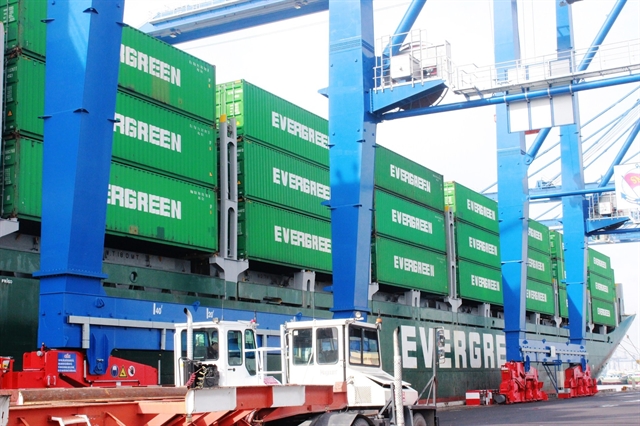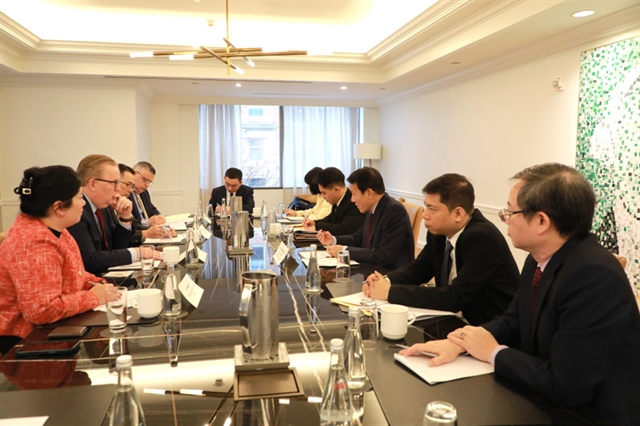 Economy
Economy

 |
| A container vessel is docked at Tân Cảng – Cát Lái Port in HCM City. Tân Cảng – Cát Lái has become the first port in Việt Nam to be awarded the Green Port title by the APEC Port Services Network Council. — Photo daidoanket.vn |
PhD. Tran Thi Mai Thanh PhD. Nguyen Van Phuong VNU University of Economics and Business*
The global context: ESG as a core pillar of trade
The integration of environmental, social, and governance (ESG) principles into global trade is no longer a prospective trend but a present-day reality. This transformation is being driven by several powerful forces. Firstly, regulatory bodies—particularly in developed markets—are introducing non-tariff barriers rooted in sustainability. The European Union (EU) is at the forefront, having established a suite of regulations that leverage its market influence to elevate global environmental and social standards.
Secondly, investor pressure has become a powerful catalyst. Sustainable finance is shifting from the periphery to the core of capital markets. Asset managers and institutional investors are increasingly screening investments based on ESG performance, acknowledging that strong sustainability credentials are associated with lower risk and long-term value creation. This reallocation of capital compels companies to demonstrate robust ESG strategies in order to attract funding.
Thirdly, corporate and consumer demand is generating a strong pull factor. A recent study revealed that ESG is becoming increasingly important in ensuring supply chain resilience, with 32 per cent of businesses already requiring ESG data from suppliers as a prerequisite for partnership. Corporations are recognising that transparent and ethical supply chains are less vulnerable to disruption and reputational risk. This shift is underpinned by the concept of “double materiality”, which obliges companies to report not only on how sustainability issues affect their financial performance but also on how their operations impact the environment and society. This principle embeds a company’s external impacts within the scope of mandatory reporting, making ESG a fundamental aspect of corporate governance—and by extension, international trade.
The EU’s regulatory gauntlet: a direct challenge to Vietnamese exports
For Việt Nam, whose economic growth is closely linked to global trade, the EU’s assertive regulatory stance presents the most immediate and tangible challenge. Three key pieces of legislation constitute this new “green wall”.
The Carbon Border Adjustment Mechanism (CBAM), which entered its transitional phase in October 2023, is intended to prevent “carbon leakage” by imposing a levy on carbon-intensive goods imported into the EU. Initially targeting sectors such as iron, steel, aluminium, cement, and fertilisers, the regulation directly impacts core Vietnamese exports. Domestic producers—many of whom rely on outdated technologies—must now begin monitoring and reporting embedded emissions, with financial penalties to follow when the definitive phase begins.
The EU Deforestation Regulation (EUDR) prohibits the import of products linked to deforestation or forest degradation. Importers must conduct extensive due diligence, including collecting precise geolocation data to prove that commodities such as coffee, rubber, palm oil, and timber were produced on deforestation-free land after 31 December 2020. With 95 per cent of Việt Nam’s coffee output coming from smallholder farmers, the logistical and financial burden of ensuring traceability across complex supply chains is considerable.
The Corporate Sustainability Reporting Directive (CSRD) marks the most comprehensive regulatory change. It significantly broadens the scope and depth of mandatory sustainability reporting for large EU companies—and crucially, also for non-EU companies with annual turnover exceeding €150 million within the EU. These companies must submit detailed, audited ESG impact reports based on the double materiality principle, encompassing their entire value chain. This exerts downstream pressure on Vietnamese suppliers to furnish high-quality ESG data if they wish to remain in the supply chain.
Việt Nam’s position: a critical ambition–action gap
Việt Nam has shown a strong national commitment to sustainable development, notably through its pledge to achieve net-zero emissions by 2050. This ambition is also evident in the corporate sector. A 2022 survey by PwC Việt Nam found that 80 per cent of respondents had made a public ESG commitment. However, the same report identified a substantial gap between ambition and action: only 33 per cent had developed concrete, costed strategies, and just 29 per cent reported having board-level discussions on ESG issues more than twice a year.
This “ambition–action gap” stems from several critical challenges. Key obstacles cited by businesses include a lack of in-depth knowledge, high implementation costs, and the absence of clear domestic regulatory guidance. While Circular 96/2020/TT-BTC mandates some basic ESG disclosures for listed companies, it lacks the rigour, breadth, and mandatory assurance requirements of frameworks like the EU’s CSRD. Moreover, Việt Nam is still in the process of finalising its national green taxonomy, which creates uncertainty for businesses and investors aiming to align with sustainable objectives. As a result, many Vietnamese enterprises—particularly small and medium-sized enterprises (SMEs), which form the backbone of the export sector—are ill-equipped to meet the demanding data and performance expectations of international partners.
 |
| Engineers inspect the installation of a rooftop solar power system in Thái Nguyên Province. — Photo baothainguyen.vn |
Pioneering the transition: private sector leadership in Việt Nam
Despite these systemic challenges, leading examples within Việt Nam’s private sector demonstrate that a proactive ESG approach is both achievable and strategically beneficial.
VinaCapital, a prominent investment management firm, has made ESG a core pillar of its investment philosophy. The firm has created a proprietary ESG scoring system to evaluate and engage with portfolio companies, actively driving value beyond regulatory compliance. For instance, VinaCapital has partnered with FPT to enhance the energy efficiency of its data centres, and invested in Quảng Ngãi Sugar (QNS) to support biomass energy utilisation and circular economy practices. Its VinaCarbon initiative also aims to pioneer the voluntary carbon market in Việt Nam, directly addressing challenges posed by mechanisms such as CBAM.
In the financial sector, the Bank for Investment and Development of Việt Nam (BIDV) is emerging as a frontrunner in green finance. By the end of 2023, BIDV’s outstanding green credit had reached nearly VNĐ71,000 billion (approximately $2.8 billion), supporting over 1,500 projects in renewable energy, clean energy, and environmental protection. The bank has issued its first green bonds in accordance with international standards and has developed a third-party-audited Sustainable Loan Framework to guide its lending activities. These steps are critical in signalling the growing availability of domestic capital to support Việt Nam’s ESG transition.
The strategic imperative: a roadmap for action
To navigate the ESG-driven transformation of global trade, Việt Nam must pursue a coordinated, collaborative strategy involving both public and private sectors.
For policymakers, the priority is to close regulatory gaps and establish a supportive ecosystem for ESG adoption. First, finalising and implementing a national green taxonomy aligned with international norms is essential. This would provide much-needed clarity for businesses and investors, define sustainable activities, and guide capital flows toward genuinely green projects. Second, a phased roadmap for mandatory ESG disclosure must be introduced and clearly communicated. This roadmap should progressively increase scope and stringency, allowing businesses sufficient time to build capacity and integrate reporting processes. Third, the government should roll out targeted support programmes for SMEs. These should combine financial incentives to offset costs, technical assistance, and nationwide training to address knowledge gaps and resource constraints.
At the same time, Vietnamese businesses must adopt a fundamental shift in mindset—viewing ESG not as a compliance burden but as a source of long-term competitive advantage. The first step is integrating ESG into core business strategies, with direct oversight from the board. Companies must also invest in robust data systems and internal or external expertise to accurately track, measure, and report ESG metrics. This capability is vital for regulatory compliance and meeting stakeholder expectations. Firms should also actively collaborate with supply chain partners to enhance transparency and traceability, particularly in sectors affected by regulations such as the EUDR. Lastly, businesses should seek partnerships with pioneering financial institutions like BIDV to access green finance instruments. These resources are instrumental in funding cleaner technologies, circular economy initiatives, and broader ESG performance upgrades.
Conclusion
The rise of ESG as a central tenet of international trade represents a pivotal moment for Việt Nam. The risks of inaction—declining competitiveness, loss of market access in the EU, and exclusion from responsible global supply chains—are clear. However, the opportunities for proactive leaders are equally significant. By embracing ESG, Vietnamese businesses can secure premium investment, build resilient operations, enhance brand reputation, and gain a sustainable competitive edge. Achieving this requires bridging the ambition–action gap through strategic policymaking, targeted capability building, and a transformative shift in business thinking. With the right actions, Việt Nam can turn this global challenge into a foundation for its next stage of sustainable development. — VNS
*Dr. Tran Thi Mai Thanh, Vice Dean of the Faculty of International Business and Economics, Deputy Head of the Department of World Economics and International Economic Relations, VNU University of Economics and Business (UEB) Dr. Nguyen Van Phuong, Lecturer of the School of Business Administration, VNU University of Economics and Business (UEB)




